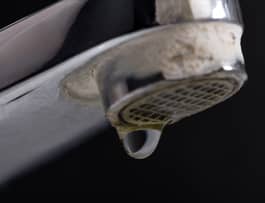Monday, August 6th, 2018
The hard truth about Cincinnati’s hard water

Why hard water is bad for your home’s plumbing and heating systems
Have you ever taken your glasses and silverware out of the dishwasher only to find spots or film all over them? The culprit is likely hard water, caused when calcium carbonate and magnesium heats up and adds solid residue on your dishes.
But hard water isn’t just a nuisance, it can also cause damage to your home’s plumbing, especially when the calcium builds up on pipes and restricts water flow.
While Cincinnati has clean tap water, most home owners find steps are needed to soften their water, because while our tap water may be safe, it’s also known for carrying high amounts of magnesium and calcium than many other cities. Basically, Cincinnati has a hard water problem.
Take a look at our article below that explains hard water, why it’s bad for plumbing, and what you can do to make sure your home’s water doesn’t amount to costly plumbing repairs.
What is hard water, anyway?
Basically, when we use the term “hard water,” we’re talking about water that his high in dissolved minerals. Usually, we’re talking about calcium and magnesium that, while safe for consumption, can build up in pipes over time.
Why is hard water a problem?
Hard water is bad for a variety of reasons. At the very least it means your soap and detergent will be less efficient, so you’ll use more of it. But the bigger concern comes when water gets heated, which you probably do on a daily basis for anything from dish washing to showers to heating your home, so hard water can adversely affect our water pipes and our heating systems, too.
Here’s a breakdown of issues hard water can cause, in order of seriousness.
- The need to use more detergent or soap for washing everything from dishes to clothes
- Soap or shampoo residue on hair, which can make it look dull
- Unsightly soap buildup on tile, bathroom and kitchen fixtures
- Spots on glasses and dishes after they’ve been washed
- Build-up in water pipes that reduces the flow of water
- Build-up in water heater systems that can cause them to use nearly 40% more energy to work
How do I know if I have hard water?
There are a few ways to test if your home has hard water or not. This simplest way is to add a little dish soap to a glass of water. Close the glass, give it a shake, and see if it produces a lot of suds. If it doesn’t you probably have hard water.
You could also ask your municipal water department for a water report on your neighborhood, which will show you levels of minerals in your water. Other options are to have the water tested by a private company, or with water hardness test strips you can find in your local home improvement or hardware store.
My water is hard. What do I do?
There are several water-conditioning products out there that will work on one part of your house, for example a water filter on a faucet. However, your best bet is to install a home water softener system for your whole house. We can help match you with the best one for your home.
Remember: when you test your water and make sure it’s soft, you’re not only increasing the quality of your life and helping your health, you’re helping to avoid costly plumbing repairs, too.
Call or Contact the at Allied Reddi-Rooter, 513-396-5300. We always come highly recommended and have earned an A+ rating from the Better Business Bureau for our expert quality of service.
